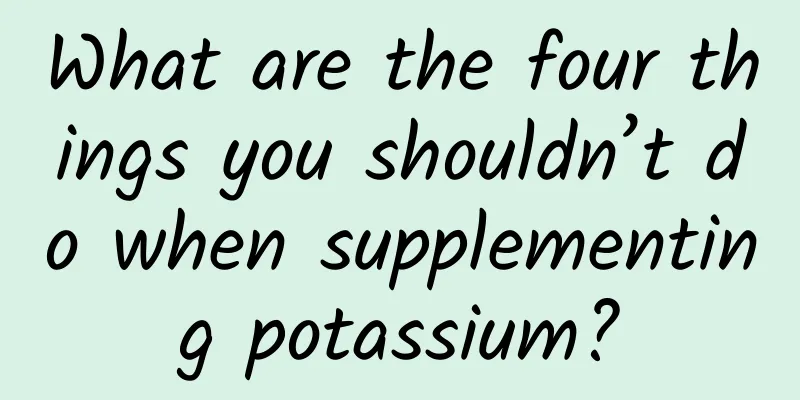What are the four things you shouldn’t do when supplementing potassium?

|
Potassium is an essential nutrient for the human body. If the human body is deficient in potassium, it will have difficulty breathing. The mind will also become apathetic, drowsy, listless, and unconscious. Some people will also experience nausea, vomiting, and a bloated feeling in the abdomen, which will affect human health. Therefore, the human body must pay attention to proper potassium supplementation every day. There are some issues to pay attention to when supplementing potassium. What are the four things not to do with potassium supplementation? Let’s take a look at it next. 1. What are the four things not to do when supplementing potassium? 1. "Supplement potassium when urine volume is above 40ml/d or 500ml/d" 2. The amount of potassium supplementation depends on the serum potassium level. For those who are just fasting, generally 2 to 3 grams of potassium chloride per day is enough for physiological needs. For those with severe potassium deficiency (serum potassium more than 2 < 2mmol/L), the total amount of potassium chloride supplemented per day should not exceed 6 to 8g, but there are exceptions to special circumstances such as severe diarrhea and acute renal failure in the polyuria stage. 3. Potassium supplement concentration: should not exceed 40mmol/L (potassium chloride 3g/l); it should be diluted and then administered by intravenous drip. Direct intravenous injection is prohibited to avoid a sudden increase in blood potassium, which may lead to cardiac arrest. 4. Potassium supplementation rate: should not exceed 20-40mmol/h. The intravenous infusion rate for adults should not exceed 60 drops/min. 2. What to eat to supplement potassium Potassium is an indispensable macroelement in the human body. A normal adult contains about 150 grams of potassium, which is distributed outside and inside cells to maintain the normal function of nerves and muscles. Once the human body lacks potassium, normal movement will be affected. There are not many foods rich in potassium, so you should be careful when choosing foods. Seaweed foods generally contain more potassium. For example, 100 grams of seaweed contains 1,640 mg of potassium, which is 17.5 times the amount of sodium; the potassium content in kelp is 2.2 times that of sodium; and the potassium content in seaweed is 3.1 times that of sodium. Therefore, seaweed soup, seaweed steamed fish, seaweed meatballs, mixed kelp shreds, kelp stewed meat, etc. should be the top-notch summer dishes. In addition, spinach, amaranth, coriander, rapeseed, cabbage, celery, onion, green onion, lettuce, potatoes, yam, fresh peas, edamame, soybeans and their products also contain high levels of potassium; among grains, buckwheat noodles and sweet potatoes have higher potassium content; among fruits, bananas are the richest in potassium. 3. Benefits of drinking more tea in summer Drinking more tea in summer is also very beneficial. Tea is rich in potassium, which accounts for about 1.1%-2.3% of the weight of tea. Drinking more tea can not only relieve heat, but also replenish potassium, killing two birds with one stone. |
<<: What are the precautions for intravenous potassium supplementation?
>>: What are the principles and precautions for potassium supplementation?
Recommend
Children at high risk of cerebral palsy, these four symptoms are the most typical
Cerebral palsy is actually a very common disease....
Why do I often get heat stroke and headache?
Heatstroke is mainly caused by overheated weather...
How to detect liver ascites
If a person develops ascites, there are no obviou...
Why do my hands shake sometimes?
When we sit quietly or hold something in our hand...
What to do if a girl has itching below
Girls should never ignore the itching down there,...
What to do about dry eye conjunctivitis
Dry eyes and conjunctivitis are very common eye d...
When is the best time to take calcium tablets?
Calcium supplementation is something that many pe...
Drinking protein powder causes diarrhea
I believe that many men want to have a body of st...
How to make scallion pancakes soft and delicious
Scallion pancake is a kind of pancake made with c...
There is a pimple in my cheek that moves
We all care about our faces. Boys will wash their...
What are the dangers of tooth extraction during menstruation?
During menstruation, women's physical constit...
How to determine the dosage of Hedyotis diffusa
Houttuynia cordata is commonly used in traditiona...
How to solve hereditary bedwetting?
Bedwetting is an embarrassing behavior. For growi...
Correct steps for soaking saffron in water
More and more people are familiar with rose tea, ...
What causes snake sores?
Herpes zoster is a name for shingles, a herpes ca...









